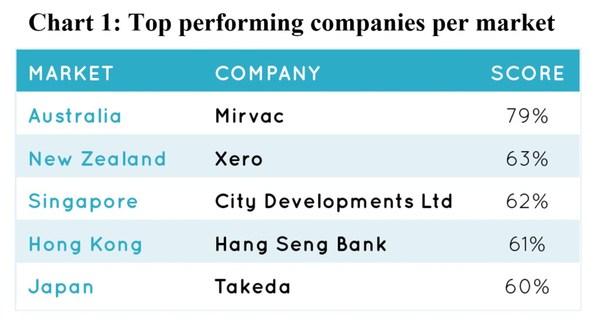share on
Overall, gender balance is still far from reach in APAC at any level, with women representing 17% of boards, 13% of executives, 19% of senior management, and 35% of the workforce.
According to a recent report by Equileap, women at the top of the corporate ladder in APAC continue to be scarce — only 4% of CEO roles and 5% of board chairs are filled by women, in this study which covers Australia, Hong Kong, Japan, New Zealand, and Singapore.
Spanning 1,181 companies representing 23mn employees, the report provides key insights per market and sectors, on specific issues ranging from equal pay and female representation to all levels, to paid parental leave and anti-sexual harassment policies. By market, Singapore stands out for highest representation of women at a senior level, with 14% of CEOs, and 26% CFOs being female. Meanwhile in Japan, less than 1% of CEOs are women.
Overall, gender balance is still far from reach in APAC at any level, with women representing 17% of boards, 13% of executives, 19% of senior management, and 35% of the workforce. Particularly, Australia was noted as best APAC market for gender equality at work, with the highest average gender equality score in the region at 46%, compared to the APAC average of 33%, and even the global average of 37%.

Among the brands surveyed, only Xero in NZ and Hang Seng Bank in Hong Kong achieved gender balance at all four company levels.
As a whole, the top performing companies per market are as follows:

Interestingly, looking into pay gaps has been a challenge, as the study noted 91% of companies surveyed do not disclose any information on the gender pay gap. On top of that, only three companies have closed the gender pay gap - Oil Search (AUS), Rio Tinto (AUS), and Hang Seng Bank (HK), and just 4% of companies have a strategy to close it.
On the topic of sexual harassment, five years since the #MeToo movement blew up, 57% of the APAC companies studied for this research do not publish anti-sexual harassment policies.
Specifically, this is the percentage of companies that are publishing their sexual harassment policies:
- Japan - 52%
- Australia - 50%
- Singapore - 26%
- New Zealand - 22%
- Hong Kong 19%
The financial sector
Equileap was able to identify some top performers in the region, with five Australian financial firms scoring gender equality scores of over 60%. However, the industry overall still has many obstacles preventing women from progressing. As such, the average score for companies in this sector in the APAC region was 36% - slightly less than the global financial sector average of 38%.
Factors impacting equality include typically long hours, which do not support family life. This means that whilst 50% of the workforce were women, typically, this proportion drops steeply in the more senior levels of any given company - across the entire region there are just eight female CEOs, out of 119 financial companies researched.
At the same time, 65% of APAC companies in the financial sector do not publish an anti-sexual harassment policy and no company in the space has closed the gender pay gap.
Diana van Maasdijk, CEO at Equileap commented on the findings: "It is perhaps unsurprising that such a diverse region produces such starkly diverse results. Companies in all five APAC markets are leading the way for workplace gender equality with scores over 60% when the global average is 37%. The world's best performing company for gender equality is Australian (Mirvac on 79%) and Hong Kong has the only company regionally and globally to have closed the gender pay gap at all company levels (China Gas)."
She added: "There is also a concentration of companies in Hong Kong and Japan with shockingly low scores across the board putting these two markets at the bottom of the global league tables."
Itsu Adachi, Executive Director, Sasakawa Peace Foundation, added: "The degree to which companies promote gender equality is one of the indicators used by investors to identify the values of a company."
With that in mind, Equileap's global gender ranking of companies uses its own gender scorecard inspired by UN Women's Empowerment Principles, which has been put together from the investors' perspective.
Images / Provided
Follow us on Telegram and on Instagram @humanresourcesonline for all the latest HR and manpower news from around the region!
share on
Follow us on Telegram and on Instagram @humanresourcesonline for all the latest HR and manpower news from around the region!
Related topics


